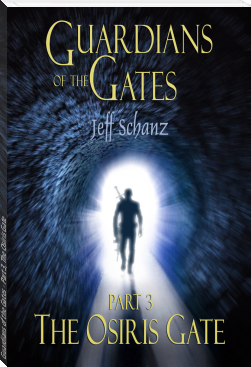Guardians of the Gates - Part 3, The Osiris Gate by Jeff Schanz (best book club books for discussion .TXT) 📖

- Author: Jeff Schanz
Book online «Guardians of the Gates - Part 3, The Osiris Gate by Jeff Schanz (best book club books for discussion .TXT) 📖». Author Jeff Schanz
Bill was nodding slightly, his eyes focused on nothing in particular, deep in thought. Doug scrunched his brows, seeming contemplative, though still not looking agreeable. The three scientists behind Bill and Doug started mumbling to each other.
Jude stepped forward. “So, if I have this right, the rift is somewhere unknown, probably nearby to this cave, and it just so happens it’s the same one we’re looking for?”
“Yeah, that’s right.”
“You can’t walk through rifts,” said Doug.
“Not ones you know about,” said Justin. “Sebastian said we were looking for something like that though.”
Bill frowned at his contemporary. “Doug, come on. You read the document same as we did. Ashe thinks he’s found a rift large enough to physically enter.”
“So? It doesn’t mean he’s right. Rifts aren’t holes. They are fingers that overlap and affect each other.”
“So certain are you?” said Valentine in a decent impersonation of Yoda.
Doug raised a brow sharply. “Have you ever seen one?”
“No. Have you?” asked Valentine, smugly assuming the other scientists hadn’t seen one either.
“Yes, I have.”
“Yeah, well…” Valentine was close to saying “your momma,” but refrained.
Bill stepped forward. “Doug, you’ve only seen six yourself. We’ve calculated there could be hundreds or thousands. You truly think there’s not a possibility that a gateway like this could exist?”
Doug grimaced. His glare reinforced his dissension, though he seemed out of valid arguments. His last recourse was to be pessimistic. “It still doesn’t give us a specific location for this dimensional gate.”
“It’s closer than we were a few minutes ago,” said Justin.
Everyone shared an awkward moment of contemplation, or perhaps just rest for their over-taxed brains. No one seemed to have another comment or response to add.
Jude decided it was time to take control of the meeting. “Alright, guys. Let’s let everyone soak that in. There’s been a lot of crazy stuff tossed around here today. And it’s possible some of it may actually be true. So, maybe we need to summarize some of this. Write it down. Run over it again and see what we have.”
The scientists on the screen all nodded except for Doug, who shrugged.
Justin nodded. Valentine scratched his chin and held a comical contemplation pose.
“Dude! Stop joking around,” said Justin to Valentine in a harsh whisper.
“Fine. Ok, already. Do whatever Jude said,” said Valentine.
Jude pulled a laptop over to the table and started typing. “Ok guys. Summarize and I’ll write it down.”
Justin sat down next to Jude, and Valentine stayed standing, placing himself nearby.
Justin said, “You wanted to do something important, Valentine. Something that mattered. You finally have.”
Valentine blew out a horse-like snort. “Just remember that when you get to my fee.”

Chapter 3
Thousands of years ago, on another version of earth, several priests wandered the Egyptian desert searching for shelter. Their exile was caused by the new pharaoh, their loyalty to the old deceased pharaoh a threat to the man-god who not only took the ruler’s throne, but killed the old ruler to get it. The official cause of death, as told to the populous, was that the old pharaoh fell out of his chariot while hunting and was trampled. The announcement was not disputed publicly. Few people knew for sure what had really happened, but the rumor was a whisper within the kingdom. To most people, it was merely the succession of kings, not always amicable, and not always legal, but it was none of their business. It was widely known that you did not question the new king, regardless of how the old one left, or you may find yourself and your family killed or jailed for your doubts. To the very brave, the only way to fight an unlawful succession was to gather an army and depose the usurper. Then the vengeful vanquisher becomes the new usurper, solving nothing, and creating yet more future opposition. So, all in all, it was best to simply accept the new rule with quiet and unfaltering acceptance.
The priests of the old regime had no interest in making opposition. But they also knew the truth. And the new pharaoh didn’t believe they would keep quiet since the murder took place in the sacramental hall, right in front of many of the priests. The old pharaoh had come to pray on his own. His enemies followed him, meaning to kidnap him and take him elsewhere to kill him. But a struggle occurred and the pharaoh was killed as a result. A heavy bronze pedestal for a sacramental cauldron was swung at the pharaoh’s head, crushing his skull. The dead pharaoh was carried off and eventually thrown in front of a chariot and horses. His crushed and crumpled body then better resembled the lie being sold about the pharaoh falling out of the chariot and getting trampled to death. The majority of the public, knowing what was best for them, questioned nothing aloud. So, the new pharaoh took the throne. Though the priests were the only ones who saw what really happened, the new pharaoh decided not to kill them immediately, thinking he needed the weight of the well-known priests coronating him to be accepted. But once that was over, the priests needed to go away. This much the priests understood.
They took their futures into their own hands, feigning a pilgrimage, a journey of discovery, or a journey to commune with the underworld. Whatever anyone would believe, as long as they left the kingdom with their lives. In the dark of a post-midnight evening, they gathered their meager possessions consisting mainly of a few idols, some sacramental accessories, a change of clothing, and all the food and water their backs could support, then set out through the sacred valley where the past pharaohs were buried.
They traveled on foot for many days, walking farther than anyone would ever dare to go without horses. The priests came to an old structure supposedly built by the god Ra himself. It was a place they had visited only once because the distance was so extreme, it would normally mark the turn-back point for anyone not wishing to permanently leave the kingdom. But they walked on. The days passed. They journeyed farther than they had ever been, through the wastelands where the spirits of the ancient ones were said to live: gods and beasts that lingered from the days before the great Egyptian civilization. Unfamiliar markings and small pictograms of a strange people were carved on large rocks. Raised areas looked like bases for walls that had long ago crumbled. Or perhaps, it was their imagination. No one could have ever lived out here. There was no water anywhere for days and days’ journey. No animals to hunt, no way to plant or find vegetation. Nothing but desolation. Yet, people had been here. The carvings proved it. And then again, perhaps they weren’t people. Whoever, or whatever had been here, weren’t visible now. Who was to say they weren’t spirits as the priests were told. Perhaps they were watching at that moment, unseen, but ever-present.
The priests had wandered for months, their food exhausted, their water, though tightly rationed, was within a cupful left to each man. Each of them had begun to worry that they had done nothing more than delay their deaths by placing their fate in the gods’ hands.
They begged Ra not to abandon them. They had been faithful. The new pharaoh was a believer is something that was a bastardization of Ra. An abomination of two gods in one. Apparently, no one was supposed to mind that Ra had changed. How could two gods be one god? How could Ra change who he was? Ra was always Ra, not Amon Ra. The priests believed that Ra would bring his judgment on the kingdom, and besides their escape from the pharaoh, they did not want to stay and become part of Ra’s punishment. Since they struck out far away from the kingdom, Ra would notice, and he would take them into his bosom and secure them in a place where they could once again honor him the way they always had. Ra would deliver them once they went far enough. But they had traveled farther than they believed they could and should go. Surely, something else was out here, somewhere.
The ends of the world couldn’t be far away. They had expected to fall off the earth and arrive in the underworld by now, yet nothing except sun and sand existed here. Maybe they were already in the underworld? Nothing could exist in that desolation but death and beasts of undying heat and fire. Perhaps they, themselves, were dead, and they had been punished to continue walking forever as their torture. But their water was near gone. If a god wished to punish them, he would’ve given them never-ending small rations of water so they would be encouraged to keep walking for eternity instead of accepting their fate and laying down on the sand to die of either dehydration or heat.
The band of eleven priests had begun to climb through some uneven terrain, populated by a combination of dunes and rock formations. Unlike the flat desert plains they had come from, many slabs of rock had been turned, twisted, and pushed from the areas deep underneath the earth’s surface. The priests assumed they had either arrived in a brand new land, or they were so close to the world’s edge that the underside was bending upward to meet them. Strange formations or not, there were areas of shade and overhang that would shield them from the sun’s relentless torture. Nearly starving to death and exhausted in all ways both mental and physical, they decided to take refuge under one of the larger structures.
They entered what looked like a cave, though it was actually a gap between two layers of earth’s crust which had tipped upward and nestled next to one another. The mouth of the cave was larger than its depth, just enough for temporary refuge from the sun. It wasn’t large enough to function as a more permanent dwelling. The priests weren’t certain, as a group, if they should be traveling any further than this, or if they had come to some sort of destination that was appointed by the gods. But at least, for a little while, they could recover in shade.
There was no water or springs anywhere, and certainly no rain, nor any way to capture the rainfall if there ever was any. If they were going to die from starvation and dehydration, at least they could do it in relative comfort. They spent a day resting and recovering. Several members went on scouting forays to see where else in this strange land might be worthwhile to go, and possibly stay. Much of the same kind of tilted earthen layers populated the landscape, none of which offered much more than shallow shelter with barely room to maneuver. One priest, however, made an interesting discovery.
His name was Ptahhomhet, the youngest and newest of the priests. He had gotten lost on his scouting mission and missed his landmark to turn back to the





Comments (0)